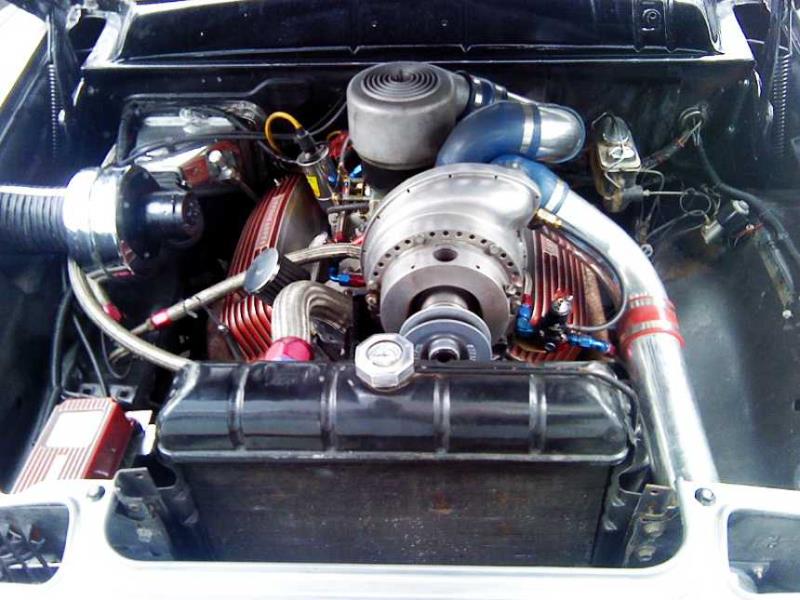|
Author
|
Message
|
|
comrade-paul
|
|
|
Group: Forum Members
Last Active: 15 Years Ago
Posts: 97,
Visits: 190
|
Johnson Rod (2/18/2009)
One too many pints while working on the Y-Block??Theres always some clever clogs who remembers old pics!   Nice one. 
 Picture taken in 1960. Funnily enough it still looks like this! Picture taken in 1960. Funnily enough it still looks like this!  1959 Mercury Monterey 312 Y Block. NORFOLK, ENGLAND, UK.
|
|
|
|
|
Johnson Rod
|
|
|
Group: Forum Members
Last Active: 15 Years Ago
Posts: 142,
Visits: 838
|
One too many pints while working on the Y-Block??
Johnson Rod
Southern California
|
|
|
|
|
comrade-paul
|
|
|
Group: Forum Members
Last Active: 15 Years Ago
Posts: 97,
Visits: 190
|
Well I have rapid acceleration at last. Turns out that I connected the vacuum pipe up wrong. I had a dumb moment at some point & blanked off the vacuum pip from the intake manifold. And then the pipe from the distributor, I connected to the carb overflow pipe!! Doh!! So I had no vacuum advance for the distributor! 
 Picture taken in 1960. Funnily enough it still looks like this! Picture taken in 1960. Funnily enough it still looks like this!  1959 Mercury Monterey 312 Y Block. NORFOLK, ENGLAND, UK.
|
|
|
|
|
Hoosier Hurricane
|
|
|
Group: Moderators
Last Active: 51 minutes ago
Posts: 3.7K,
Visits: 323.1K
|
If you are driving in cool weather conditions, and you have the heat riser passages blocked or the heat riser missing or tied open, that can cause a flat spot also.
John - "The Hoosier Hurricane"

|
|
|
|
|
Ted
|
|
|
Group: Administrators
Last Active: Yesterday
Posts: 7.5K,
Visits: 205.8K
|
As Paul mentions, a vacuum leak is a possibility and a vacuum gauge can help to determine this. But assuming that checks out, is the accelerator pump pumping fuel when working the linkage? Is the accelerator pump linkage adjusted correctly at the carb? If there is free play in the accelerator pump arm in the idle position, then readjust the accelerator pump linkage so there is only 0.015” additional travel in the arm at full throttle. Essentially, the pump diaphragm should be almost at the point of being bottomed out at full throttle when properly adjusted.
  Lorena, Texas (South of Waco) Lorena, Texas (South of Waco)
|
|
|
|
|
pcmenten
|
|
|
Group: Forum Members
Last Active: 8 Years Ago
Posts: 375,
Visits: 1.1K
|
Sounds like you might have a vacuum leak.
Best regards,
Paul Menten
Meridian, Idaho
|
|
|
|
|
63 alaskan
|
|
Hitting on all eight cylinders
Group: Forum Members
Last Active: 15 Years Ago
Posts: 10,
Visits: 334
|
Is your "flat spot" momentary as if the carb accelerator pump is weak? A weak accelerator pump and a vacuum advance not working optimally as Ted said can cause a need to feather the throttle. How is the vacuum advance connected- manifold or ported? What is the initial and total advance in the distributor anyway?
Steve
|
|
|
|
|
MoonShadow
|
|
|
Group: Forum Members
Last Active: Yesterday
Posts: 4.6K,
Visits: 38.4K
|
I hope the club plate on that red 55 was a "Y-Blocks Forever" plate!  Great looking run. Thanks for posting it. Chuck in NH
Y's guys rule!
Looking for McCullouch VS57 brackets and parts. Also looking for 28 Chrysler series 72 parts. And early Hemi parts.
 
MoonShadow, 292 w/McCulloch, 28 Chrysler Roadster, 354 Hemi)
Manchester, New Hampshire
|
|
|
|
|
comrade-paul
|
|
|
Group: Forum Members
Last Active: 15 Years Ago
Posts: 97,
Visits: 190
|
Thanks for replies. I know the timing is A1 perfect as is the distributor. The car hums along nicely, I just have a flat spot on pull away, so I have to feather the throttle and pull away gently. Once moving I can bowl along beautifully. Just the acceleration is gradual rather than rapid due to my flat spot. See this video of a run we did on December 28th. http://www.youtube.com/watch?v=mOICudPGjAw About 15 seconds in you will see me pull away behind a red 55/56 Ford. He shoots out, I move off slowly. The gold & white 59 Ranchero really pulls away fast & thats a Y.
 Picture taken in 1960. Funnily enough it still looks like this! Picture taken in 1960. Funnily enough it still looks like this!  1959 Mercury Monterey 312 Y Block. NORFOLK, ENGLAND, UK.
|
|
|
|
|
Ted
|
|
|
Group: Administrators
Last Active: Yesterday
Posts: 7.5K,
Visits: 205.8K
|
I’ll suggest checking out the distributor first. Assuming the electrical part of the distributor is in good condition, then use a timing light to check out both the mechanical and vacuum advance portions. With the timing light hooked up and reading the TDC mark on the damper, simply rev the engine up and observe the TDC mark with the vacuum advance line to the distributor both connected and disconnected. You should see significant movement of the TDC mark in both instances but even more with the hose hooked up. If you see no movement of the timing mark on the damper with the distributor hose unhooked when bringing up the rpms, then the distributor will need to be disassembled so that the mechanical advance portion of the distributor can be freed up. If there is movement of the TDC mark when reving the engine with the hose unhooked but it doesn’t change when hooking up the hose, then the vacuum advance chamber or the hose itself is faulty. If there is no movement of the TDC mark with the hose either hooked up or not while speeding up the engine, then both the mechanical and vacuum advance portions of the distributor need attention. If the distributor checks out and isn’t the source of the problem, then other things to check and report on would include manifold vacuum readings and the results from doing a cranking compression test.
  Lorena, Texas (South of Waco) Lorena, Texas (South of Waco)
|
|
|
|